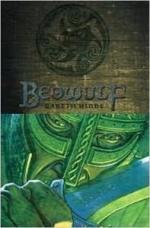[2] The passage ‘Wundur ... buan’ (3063-3066), M. took to be a question asking whether it was strange that a man should die when his appointed time had come.—B. sees a corruption, and makes emendations introducing the idea that a brave man should not die from sickness or from old age, but should find death in the performance of some deed of daring.—S. sees an indirect question introduced by ‘hwar’ and dependent upon ‘wundur’: A secret is it when the hero is to die, etc.—Why may the two clauses not be parallel, and the whole passage an Old English cry of ’How wonderful is death!’?—S.’s is the best yet offered, if ‘wundor’ means ‘mystery.’
[3] For ‘strude’
in H.-So., S. suggests ‘stride.’ This
would require
‘ravage’ (v. 16)
to be changed to ‘tread.’
[4] ‘He cared ... sight
of’ (17, 18), S. emends so as to read as
follows: He (Beowulf)
had not before seen the favor of the avaricious
possessor.
[5] B. renders: That
which drew the king thither (i.e. the
treasure) was granted
us, but in such a way that it overcomes us.
[6] ‘Folc-agende’
(3114) B. takes as dat. sing. with ‘godum,’
and
refers it to Beowulf; that
is, Should bring fire-wood to the place
where the good folk-ruler
lay.
[7] C. proposes to take ‘weaxan’ = L. ‘vescor,’ and translate devour. This gives a parallel to ‘fretan’ above. The parenthesis would be discarded and the passage read: Now shall the fire consume, the wan-flame devour, the prince of warriors, etc.
XLIII.
THE BURNING OF BEOWULF.
{Beowulf’s pyre.}
The
folk of the Geatmen got him then ready
A
pile on the earth strong for the burning,
Behung
with helmets, hero-knights’ targets,
And
bright-shining burnies, as he begged they should have
them;
5
Then wailing war-heroes their world-famous chieftain,
Their
liegelord beloved, laid in the middle.
{The funeral-flame.}
Soldiers began then to make on the barrow The largest of dead-fires: dark o’er the vapor The smoke-cloud ascended, the sad-roaring fire, 10 Mingled with weeping (the wind-roar subsided) Till the building of bone it had broken to pieces, Hot in the heart. Heavy in spirit They mood-sad lamented the men-leader’s ruin; And mournful measures the much-grieving widow 15 * * * * * * * * * * * * * * * * * * * * * * * * * * * * * * * * * * * 20 * * * * * * *
{The Weders carry out their lord’s last request.}




